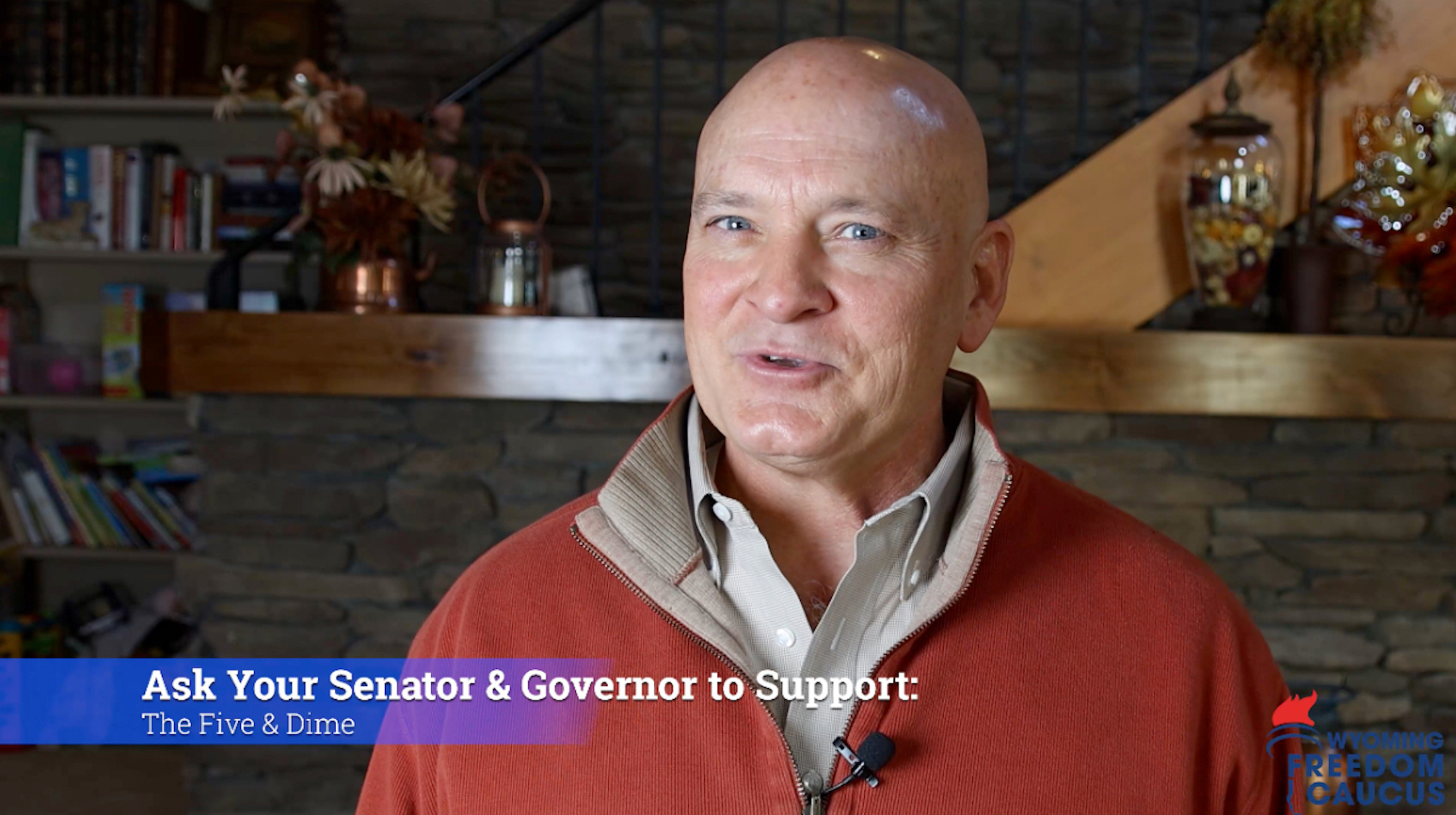
• Bloc of hardline Republicans pledges to pass five ‘key bills’ related to elections, immigration, education and other issues in the first 10 days of session.
By Maggie Mullen, WyoFile.com
As the Wyoming Freedom Caucus prepares to assume control of the House in the Wyoming Legislature for the first time, the group of hardline Republicans announced an ambitious plan to pass five “key bills” in the first 10 days of the 2025 general session.
“In this last election, you spoke to us loud and clear,” Freedom Caucus Chairman Emeritus Rep. John Bear (R-Gillette) said in a video posted on the caucus’ website.
“We heard you in town halls and on your doorsteps. What you gave us was a mandate to make some changes in the state of Wyoming,” Bear said.
The caucus calls it the “Five and Dime Plan.”
It includes legislation to restrict the voter registration process, invalidate driver licenses issued to unauthorized immigrants by other states, prohibit diversity, equity and inclusion programming in higher education, ban state investments in environment, social and governance funds and bring back a property tax relief bill vetoed by Gov. Mark Gordon earlier this year.
The priorities of the caucus are not surprising. All have either made previous appearances in unsuccessful legislation and rules, or been the subject of campaign promises in the 2024 election.
The priorities, however, reveal where the interests of the caucus diverge from that of the governor, whose supplemental budget requests focused on upping various Medicaid reimbursement rates, additional funding for the state’s property tax refund program, more money for litigating against federal regulations and replenishing funds depleted by a historic fire year.
It’s not unusual for lawmakers, particularly leadership, to announce legislative priorities ahead of the session, but rarely have Wyoming legislators coined catchy names for a package of bills or proposed deadlines beyond the existing structures of the legislative calendar for getting the job done.
The odds the legislation makes it through the House are strong. Not only does the Freedom Caucus hold a majority of the 62-member House, Republicans nominated and elected caucus members to the lower chamber’s leadership positions. And it’s leadership who decides when legislation is heard on the floor, and to which committee it is assigned.
The Senate’s level of support for the “Five and Dime Plan” remains to be seen.
While the overall makeup of the Senate scarcely changed with the 2024 election, the Freedom Caucus is disgruntled over the upper chamber’s recent committee assignments, which include a mix of Freedom-Caucus-aligned and more moderate Republican chairs.
In the meantime, the Freedom Caucus is asking voters for a hand.
“Please show your continued support by asking your senator and our governor to support the five and dime and this conservative response to your mandate,” Bear said in the video.
Senate President-elect Sen. Bo Biteman (R-Ranchester) did not respond to WyoFile’s request for comment by press time.
Voter registration, driver’s licenses
The exact details of the legislation remain to be seen as none had been posted to the Wyoming Legislature’s website by press time. (They will likely be made public in the coming weeks ahead of the session.)
But the Freedom Caucus’ top pick mirrors that of Secretary of State Chuck Gray, who called on lawmakers last week to pass legislation requiring proof of residency and U.S. citizenship when registering to vote.
More specifically, the caucus plans to “create clear statutory authority for the Wyoming Secretary of State to promulgate rules requiring voters to prove WY residency and to ensure that non-citizens cannot register to vote in WY,” according to its website.
Such legislation would likely fall in line with comments Gordon made when he rejected the rules in April proposed by Gray to have such requirements.
“Unless and until the Legislature grants the Secretary of State more explicit authority allowing for rulemaking to add to those statutory requirements at the time of registration, I believe these rules are a breach of the separation of powers with the legislative branch, as indicated by the Management Council’s recommendation,” Gordon wrote in a letter outlining his decision at the time.
Nineteen states and the District of Columbia have enacted laws to allow unauthorized immigrants to obtain driver’s licenses, according to the National Conference of State Legislatures.
In 2023, Florida passed a law to prohibit an unauthorized immigrant with a driver’s license from another state from operating a vehicle. A similar bill passed the Wyoming Senate earlier this year, but died in the House when it did not secure committee approval by deadline.
“This simple bill will help WY crack down on illegal immigration and to ensure consistency in our statutes and rules,” according to the Freedom Caucus’ website.
DEI and ESG
The Wyoming Legislature is the largest funder of the University of Wyoming. Earlier this year, lawmakers cut the university’s block grant by $1.7 million and forbade it from spending state funds on its Office of Diversity, Equity and Inclusion.
In May, UW’s Board of Trustees backed President Ed Seidel’s recommendation to close the office. Now, the Freedom Caucus wants more.
It will bring legislation to “prohibit the University of WY and Wyoming’s Community Colleges from engaging in discriminatory hiring or continuing education requirements that place moral, historical, or other blame on a person or group of people on the basis of immutable characteristics,” according to its website.
Enrollment is down at the state’s only four-year public university. The Freedom Caucus says passing such legislation “will attract the free thinking cowboys and cowgirls we want attending our university.”
Last year, the Wyoming State Loan and Investment Board — a body that includes the state’s top five elected officials — approved a policy to require companies doing business with the state to disclose any ESG investment principles.
ESG is a type of investment strategy that takes environmental, social and governance into account while evaluating business risks and opportunities.
Mirroring legislation brought by Sen. Biteman in 2023, the Freedom Caucus said it plans to prohibit the state from investing in funds that prioritize ESG standards, diverting that money instead into “funds promising the highest financial rate of return.”
Biteman’s bill stalled out in the House Appropriations Committee amid concerns that it would harm the state’s ability to invest in a wide range of companies, including those in the energy industry, according to the Wyoming Tribune-Eagle.
Property taxes
While Gordon signed a package of property tax relief bills into law in March, he vetoed one that would have applied a 25% exemption to the first $2 million of a home’s fair market value.
Gordon rejected the bill because it “would have only provided a temporary and very expensive tax exemption to all Wyoming homeowners at the expense of other taxpayers in our energy industries, retail and manufacturing sectors,” he wrote in his veto letter.
The bill included a $220 million appropriation to reimburse local governments for lost revenue — property taxes do not fund state operations but rather local services like K-12 education and law enforcement.
The Freedom Caucus said it plans to bring back the bill and committed to including “a backfill to local governments.”
“But the House isn’t stopping there,” Bear said in the video. “We’ve got dozens of other priorities.”
The video also mentioned repealing gun-free zones, universal school choice and banning ballot drop boxes.
The 2025 general session begins Jan. 14.
WyoFile is an independent nonprofit news organization focused on Wyoming people, places and policy.





